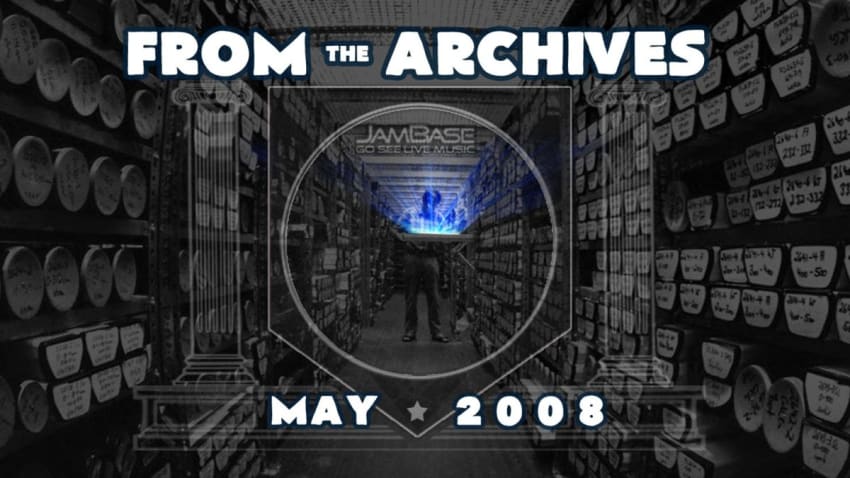Saul Williams | 04.09.08 | NYC
By Team JamBase May 5, 2008 • 12:40 pm PDT

Saul Williams :: 04.09.08 :: The Fillmore East at Irving Plaza :: New York, NY
 |
“They told you that this was a show,” Williams commented to the crowd at The Fillmore East at NYC’s Irving Plaza, “but what they didn’t tell you was that this was a ritual.” Sharing the stage with his band (DJ, keyboardist, guitarist), Williams led the crowd through a sonic assault on his musical catalog, pulling largely from his most recent album, the Trent Reznor-produced The Inevitable Rise and Liberation of Niggy Tardust! (available only online at www.niggytardust.com).
Reznor receives songwriting credits on the new album, and the music is reminiscent of his avant garde Nine Inch Nails, a band that crafted a whole genre of electronica rooted in industrial intensity, banging beats and atonal anarchy. The heavy hitting style transfers seamlessly to Williams’ words, lending a no-holds-barred musical foundation to his take-no-prisoners lyrics.
“Banged And Blown Through”, played early in the set, combined an Armageddon-worthy, throbbing beat with futuristic anxiety-inducing keyboard loops, the ominous quality of the song broken only by the string samples that built through the chorus. While drawing on influences as diverse as NIN and Seal, the song was still all Saul. With a backing chant of “Instruments!” Williams sang to his inner muse, who he called “Conductor,” asking that he be moved to create. He sang, “Who serves to protect the orchestra in me? / I feel electricity / Can you bring out the song in me?”
 |
Williams took a few moments after this song to express some of his thoughts on race, racial identity and racism. He spoke quickly, dropping the poetics and the persona of performer as he fired off his thoughts on the detrimental affects of racism, asserting, “You cannot curse the part without damning the whole.” Williams stated simply the need to evolve into a post-race society and to stop using skin color as a yardstick of identity. “Our generation,” he claimed, “even if we haven’t been able to articulate it, knows that race is a social construct, that there is no science behind it. Anything that we place after the words ‘I am’ is self-destructive, especially when we check a little box that names colors that we actually aren’t. There is no white. There is no black. History is behind us. The future is ours. Fuck the bullshit, keep dancing”.
Williams has always been verbose in a revelatory fashion, and his poems, songs and speeches have a way of coming across as nuggets of knowledge you’ve always possessed but might have left forgotten in the dustbins of your brain. Williams serves as the catalyst to activate these jewels of neglected wisdom, as he brings them out, polishes them and places them squarely in front of your face. The effect can be electrifying, as the artistry of Williams’ wordsmithing collides with the shock of epiphany.
Saul Williams seems to be on a mission of realization and recognition. No matter the medium his message takes, there is always a quality of realness that encompasses his art. Even when couched in electronic chaos, his lyrics retain an organic quality, his sentiments soaked in earthy substance. Williams introduced the song “Black Stacey,” from his self-titled 2004 album, by giving the crowd some insight into his own biographical background, eventually reaching the summary that “this song is about learning to be comfortable in your own skin.”
 |
Williams continues to further explore this theme in “Black Stacey,” imploring others to follow his lead and to drop their own façades. He rhymes, “All you baller playas got some insecurities too / that you could cover up, bling it up, cash in and ching ching it up, lock it down and string it up / Or you can share your essence with us / ‘Cause everything about you couldn’t be rugged and rough / And even though you tote a Glock and you’re hot on the streets / if you dare to share your heart we’ll nod our heads to its beat / And you can call your gang, your posse and the rest of your crew / And while you’re at it get them addicts and indigents, too / I plan to have a whole army by the time that I’m through / To load their guns / with songs they haven’t sung.”
In a world that increasingly favors illusion over reality and style over substance, Williams’ appeal to authenticity and call to creativity couldn’t come at a better time. We could all use a bigger dose of what Saul Williams is offering up. And thanks to the quality of what he is producing and to his growing exposure, it looks like we just might get it.
JamBase | NYC
Go See Live Music!
